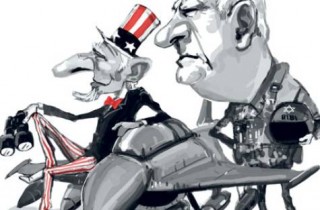
Americans have mostly built lives where we don’t have to be bothered by events outside our own little worlds. But being a good citizen, holding leaders accountable, and voting for the right people requires a little bit of attention.
by Keith Porter
U.S. foreign policy affects almost every aspect of our daily lives. Prices, jobs, the supply of gasoline, taxes, and the life and death of our nation’s soldiers are impacted by how we interact with the rest of the world.
And if we get past those self-centered reasons for caring about U.S. foreign policy, we can start to think about how others are affected by America’s actions. At our best, the United States can bring hope and light to the neediest people in the world. I have seen Americans doing this good, hard work in nasty places all over the planet.
At our worst, we bring pain, breed fear and unleash the fury of those who conclude we are part of the same tyranny against which they have always fought. Too often, people hear about American values and then see quite different American actions. People who should be our natural allies turn away with disillusionment and disappointment.
Yes, there are people who seek fault in all actions by America overseas. I am not one of them, and I don’t think you should be either. The path of “blame America first” leads to a dead end. American leadership, leadership marked by pulling together those who share a common interest in the common good, is a vital force in the world. Tossing it away would be a sin.
On the flip side, there are those who want to forever build American global supremacy as the only path to American security. And this path leads to bankruptcy and inevitable retribution. Like holding a fistful of sand, the harder we squeeze, the faster we lose our grip.
Finding the Middle Path
There is a middle path. It is not mysterious, and it does not require deep research by think-tanks and gurus. In fact, most Americans already grasp it. In fact, many mistakenly believe this middle path is already the foreign policy of the United States. And this explains why they are shaken (or in denial) when they see overt evidence of an America abroad they do not recognize.
Most Americans believe in American values: democracy, justice, fair play, hard work, a helping hand when needed, privacy, creating opportunities for personal success, respect for others unless they prove they don’t deserve it, and cooperation with others who are working toward the same goals.
These values work in our homes and our neighborhoods. They work in our communities and our national life. And they work in the wider world as well.
The middle path for foreign policy involves working with our allies, rewarding those who share our values, and joining arms against tyranny and hatred. It is slow hard work. It has much more in common with the tortoise than the hare. Teddy Roosevelt said we need to walk softly and carry a big stick. TR understood that walking softly was a sign of both caring and confidence. Having the big stick meant we had a great deal of time to work out a problem. Resorting to the stick meant that other means had failed. Resorting to the stick does not require shame, but it does call for sober and serious reflection. Resorting to the stick was (and is) nothing to be proud of.
Taking the middle path means holding ourselves to high standards. Americans never quite grasped what happened with those pictures from the Abu Ghraib prison in Iraq. The rest of the world never saw how sickened average Americans were by those images. The rest of the world expected to hear America say out loud what most Americans were thinking: What happened in that prison, whether it was two Americans or 20 or 200 who were responsible, was awful, it is not what this country stands for, and we are all ashamed to know that this was done in the name of America. Instead, all the world saw were American leaders trying to downplay the significance of the pictures and pass the buck. An opportunity to show the world what America really stands for slipped away.

Demanding American control over the world is out of step with our values. It creates more enemies and it encourages those enemies to band together against us. It makes the United States the target for every grievance in the world. Likewise, withdrawing from the world leaves too many open options for those opposed to our values. We seek to be neither an 800-pound gorilla in the world nor to withdraw into our cocoon.
Neither of those paths will make us more secure. But the middle path for foreign policy, working with our allies, rewarding those who share our values, and joining arms against tyranny and hatred, holds the potential to spread prosperity around the world….a prosperity that will bounce back on us as well.
As American citizens….voters….it is our job to hold American leaders to this middle path in the world. This will not be easy. Sometimes quick action to protect business interests will need to take a back seat to other values. Sometimes we will have to sever relationships with old allies that don’t share our interests.
When we don’t live up to our own values, we will need to point it out fast…before others even have the chance. And it will require that we stay informed.
Americans have mostly built lives where we don’t have to be bothered by events outside our own little worlds. But being a good citizen, holding leaders accountable, and voting for the right people requires a little bit of attention.
Not everyone has to subscribe to Foreign Affairs and start reading newspapers from around the world. But a small awareness of events overseas, beyond the disaster reports on television news, would help. Most importantly, when American leaders start talking about some foreign “enemy,” our ears should perk up. We should listen to the charges, seek out other views, and weigh the proposed actions against what we know are the true American values.
Keith Porter has been involved in international affairs journalism for almost 25 years. He has reported from over 20 different countries and interviewed hundreds of world leaders and foreign policy experts. Radio documentary projects produced and co-produced by Keith have involved prominent broadcasters including Walter Cronkite, David Brancaccio, David Brown, Charlayne Hunter-Gault, Simon Marks, and Kristin McHugh. Keith is Director of Communication and Outreach and Executive Radio Producer for the Stanley Foundation, an international affairs policy and educational group in the American Midwest.
More
- Building a Moderate U.S. Foreign Policy
- What can YOU do about U.S. Foreign Policy?
- Who Makes U.S. Foreign Policy?
- What Is “Transformational Diplomacy”?
ATTENTION READERS
We See The World From All Sides and Want YOU To Be Fully InformedIn fact, intentional disinformation is a disgraceful scourge in media today. So to assuage any possible errant incorrect information posted herein, we strongly encourage you to seek corroboration from other non-VT sources before forming an educated opinion.
About VT - Policies & Disclosures - Comment Policy




